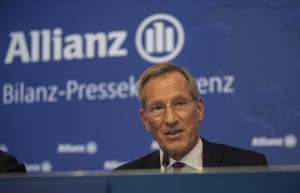German insurer Allianz suffered a humiliating blow on Friday with the resignation of renowned investor Bill Gross as leader of PIMCO, the asset manager Allianz relies on for one fourth of its operating profit.
News of Gross’s immediate departure wiped more than 4.3 billion euros off the insurer’s market capitalization and comes at a delicate time for its leadership, with the contracts of Chief Executive Michael Diekmann and five more of the insurer’s 11 board members due to expire at the end of the year.
The suddenness of Gross’s exit also rekindles long-running questions about the amount of control Allianz has over one of the world’s biggest asset managers that has seen $35 billion of investor outflows this year as well as the departure of CEO Mohamed El-Erian following a row with Gross.

The latest turmoil forms a difficult backdrop for discussions in Allianz’s supervisory board, which may ask Diekmann and other top executives to stay on. The supervisory board is due to meet on Thursday, sources familiar with the proceedings told Reuters.
Allianz has said its supervisory board would tackle personnel issues in October but declined to confirm the Oct. 2 meeting date and would not comment on any management changes.
Big investors say it could be exactly the wrong moment for a major leadership revamp at Europe’s largest insurer.
“We would welcome it if Mr. Diekmann would stay on as chief executive for another one or two years, to then hand over a house that is in order and free of legacy problems,” said Ingo Speich of Union Investment, one of Allianz’s top 10 investors according to Thomson Reuters data.
PIMCO has seen its 16th straight month of outflows and is in the midst of a Securities and Exchange Commission probe into whether one of Gross’s funds artificially inflated returns.
Morningstar, a fund research firm, said Gross’s departure could lead investors to pull hundreds of billions of dollars in assets from PIMCO and invest them with Janus Capital Group , the rival firm that he is joining.
Gross’ move was seen as a huge coup for Janus. Shares in the group, which has less than $180 billion in assets under management, a fraction of PIMCO’s total assets, rocketed 33 percent.
Allianz moved swiftly on Friday to highlight the experience of its bench of investment managers but it remains to be seen how many investors will defect with the 70 year-old Gross as he seeks to rejuvenate his image as the market’s “bond king” after founding PIMCO 43 years ago.
The stakes for Allianz remain high as the new team works to shore up performance at the $2 trillion asset manager.
“We think the extent of damage caused to PIMCO’s image, and the size of consequent outflows, now largely depends on how PIMCO and Allianz manage the transition to a ‘post Bill Gross era’,” said Nick Holmes, an analyst at Societe Generale.
“While it is conceivable that PIMCO could eventually emerge stronger from this debacle, we think this will weigh on the shares for some time,” Holmes added.
Allianz’s share closed down 6.2 percent on Friday.
The insurer’s asset management arm, which also includes Allianz Global Investors but is principally made up of PIMCO, is expected to deliver up to 2.9 billion euros ($3.7 billion) of the insurer’s 10 billion euro target operating profit this year.
It posted 1.3 billion in operating profit in the first six months, down over one fifth from the same period a year earlier.
PIMCO is not the only hot spot that Diekmann must address.
The insurer said earlier this month that it may sell parts of its U.S. property and casualty business Fireman’s Fund after struggling for years to bring underwriting losses under control.
Fireman’s Fund commercial property and casualty (P&C) business will be integrated into the specialty insurance business Allianz Global Corporate & Specialty (AGCS), giving the combined business more than $3 billion in revenues, Allianz said.
Analysts had long urged the sale of Fireman’s Fund, which Allianz has had to repeatedly shore up financially due to expected rises in the cost of past claims.
(1 US dollar = 0.7886 euro)
(Additional reporting by Simon Jessop and Nishant Kumar in London, editing by Carmel Crimmins)





















 Execs, Risk Experts on Edge: Geopolitical Risks Top ‘Turbulent’ Outlook
Execs, Risk Experts on Edge: Geopolitical Risks Top ‘Turbulent’ Outlook  Experts Say It’s Difficult to Tie AI to Layoffs
Experts Say It’s Difficult to Tie AI to Layoffs  Beazley Agrees to Zurich’s Sweetened £8 Billion Takeover Bid
Beazley Agrees to Zurich’s Sweetened £8 Billion Takeover Bid  Preparing for an AI Native Future
Preparing for an AI Native Future 










